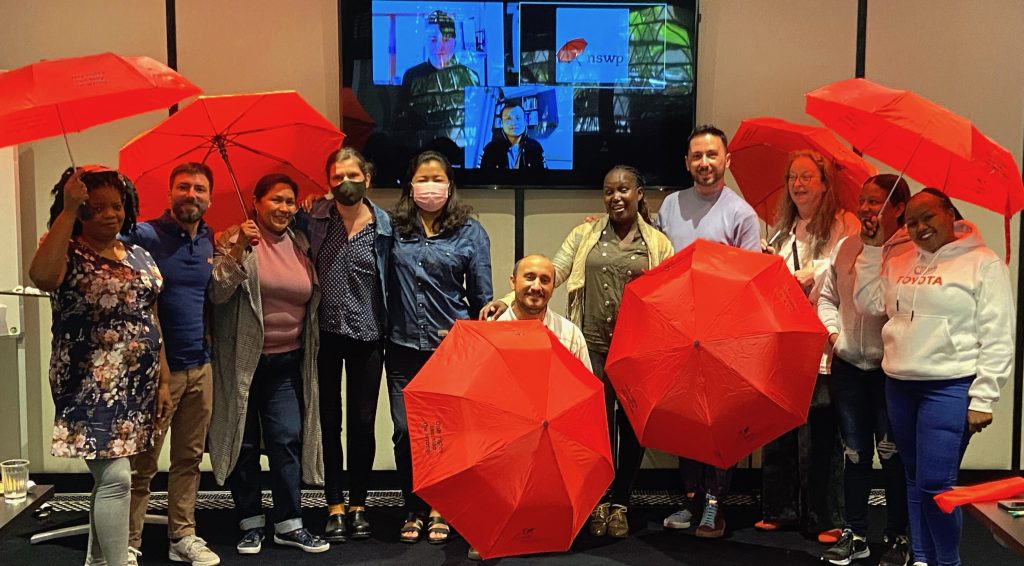A New Programme for 2022 with the Sex Worker Networks Consortium: Building Resistance and Resilience & Strengthening Human Rights Advocacy
The Sex Worker Networks Consortium was brought together in 2013 with funding from the Robert Carr civil society Networks Fund, so named after the legendary HIV & human rights activist Dr Robert Carr, uniting sex worker-led networks from across the globe – SWAN has worked alongside Asia Pacific Network of Sex Workers(APNSW); African Sex Workers Alliance (ASWA); Caribbean Sex Work Coalition (CSWC); and La Plataforma LatinoAmérica de Personas que Ejercen el Trabajo Sexual (PLAPERTS) and led by The Global Network of Sex Work Projects (NSWP).
For the past six years, the SWNC has mainly been focused on the roll-out of the Sex Worker Implementation Tool (SWIT), an international standard of practical guidance on providing effective HIV and STI programming for sex workers. It advocates for the meaningful involvement and leadership of sex workers at every level: from condom distribution and sex-worker-led outreach to community resource centres, as well as the full decriminalisation of sex work. This is in addition to a wider scaling-up of services for sex workers, on the global, regional, and national levels. In the CEECA region, SWAN has implemented this programme in 7 countries: Kazakhstan, Ukraine, Kyrgyzstan, Georgia, North Macedonia, Russia, and Armenia.
More recently, The Sex Worker Networks Consortium has received a new grant from RCNF for the 2022-2024 cycle, this time with a focus on human rights concerning social protection issues. The COVID-19 pandemic in particular has drawn attention to how, due to criminalisation, stigma, mistrust of institutions and bureaucratic hurdles, sex workers were largely left to fall through whatever safety nets were provided by governments, suffering through the worst effects of the pandemic unaided. For example, in Kyrgyzstan during the initial COVID-19 lockdowns, many sex workers were unable to access government assistance in the form of food packages because their place of residence was marked as a hotel or sauna. In Armenia, we have been informed that transgender sex workers face barriers to accessing healthcare due to discrepancies with their gender marker on the legal documents required for health insurance. The past few years have highlighted what has always been and still is a deeply rooted problem for sex workers worldwide, and one which intersects with issues around migration, LGBTQ rights, poverty, homelessness, illiteracy, and sexual and reproductive health rights. Understanding this web of obstacles is the first step to untangling the barriers that keep sex workers from accessing the basic rights enjoyed by other citizens.
The 3-year RCF grant will begin by building up the influence and capacity of our regional sex-worker-led networks to ensure they are more representative, democratically governed, and sustainable. With this increased capacity, our organisations will be better able to document cases of human rights abuse happening to sex workers in their regions. This could cover any instance in which sex workers lose access to their human rights, with a focus on state violence & discrimination, barriers to access to state support such as social care, unemployment benefits, housing support and healthcare. Of particular note given recent developments will be the availability of social protections for sex workers during humanitarian crises, and especially for migrants.
In April, our Executive Director, Staša Plecas, and Programme Officer, Trajche Janushev met in person in Barcelona with two representatives from each member of the Sex Worker Networks Consortium and together with NSWP staff developed a global framework to document human rights issues. They agreed on defining common priorities for social protection and sexual and reproductive health rights, as well as deciding on the common research questions and finalising steps and timelines for regional training, data collection, and reporting.
In the following year, SWAN will adapt this global framework to Eastern European and Central Asian contexts, working with national partners to review and adapt the global human rights documentation tool and core curriculum to include specific regional issues not captured in the global framework.
In the final quarter of 2022, we will bring together two sex worker activists from seven SWAN member organisations to hold a workshop on regional capacity building and leadership development, with the additional goal of training them to implement the human rights documentation tool on a national level and to enhance their knowledge and understanding of the human rights that underpin social protection and access to SRHR services. Here, we can go through and adapt the global framework to develop work plans for each country, including timelines for training, data collection, and advocacy strategies.
Small national grants will also be distributed to 7 countries: Kazakhstan, Ukraine, Kyrgyzstan, Georgia, North Macedonia, Russia, and Armenia. National community-led organizations in these countries will then begin this implementation of human rights documentation to gather evidence. This evidence can then be used for national advocacy on access to social protection and SRHR in 2023 and the implementation of advocacy strategies in 2023 and 2024. We hope to equip these Sex worker leaders to effectively engage in national, regional and global policy platforms and amplify the voices and lived experiences of sex workers in all their diversity. Sex workers must have a voice in informing the social protection policies which all too often leave us out in the cold. We hope that this campaign will bring us closer to this goal and that we will come to a day when sex workers have a seat at the table in building policy on healthcare, welfare and social protection.
